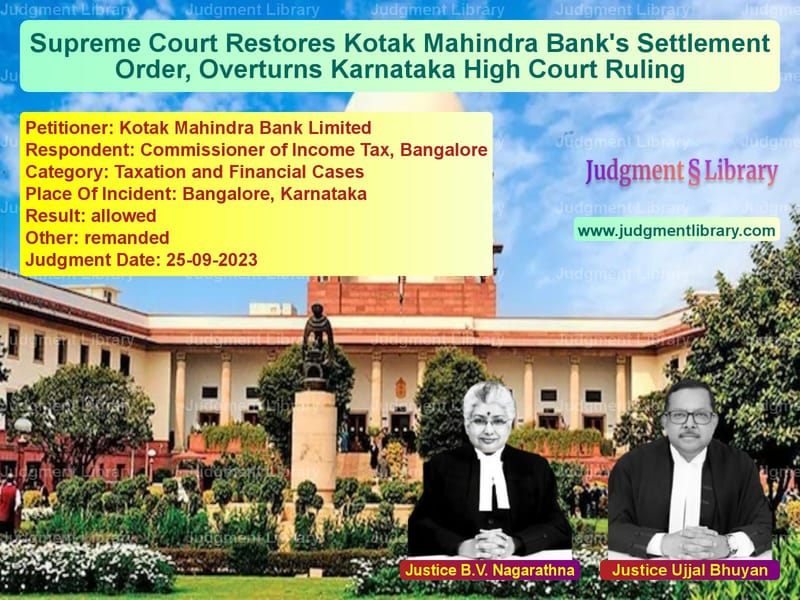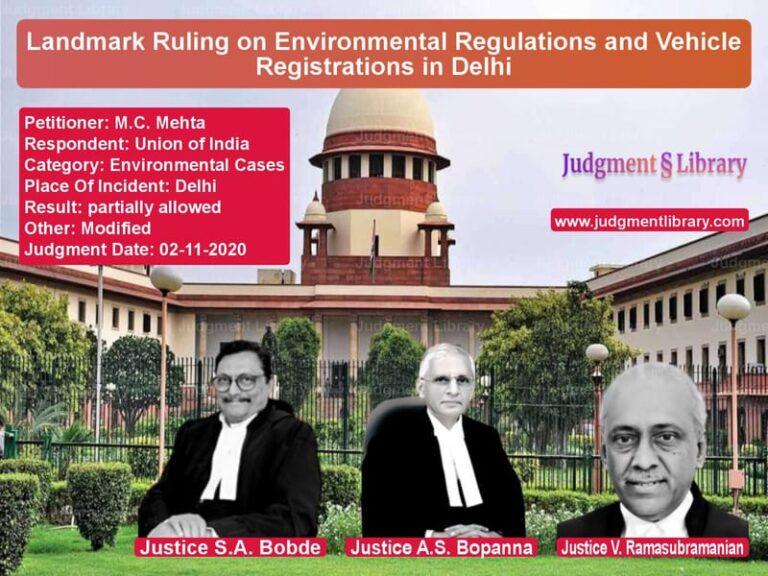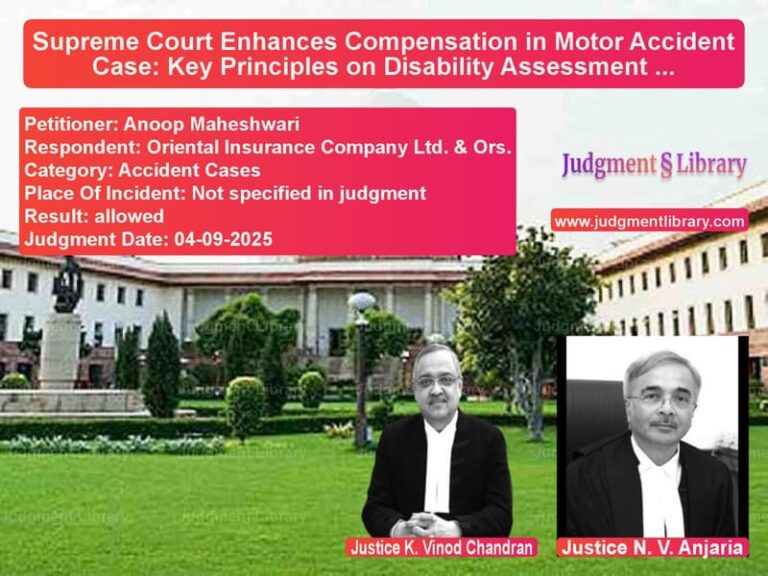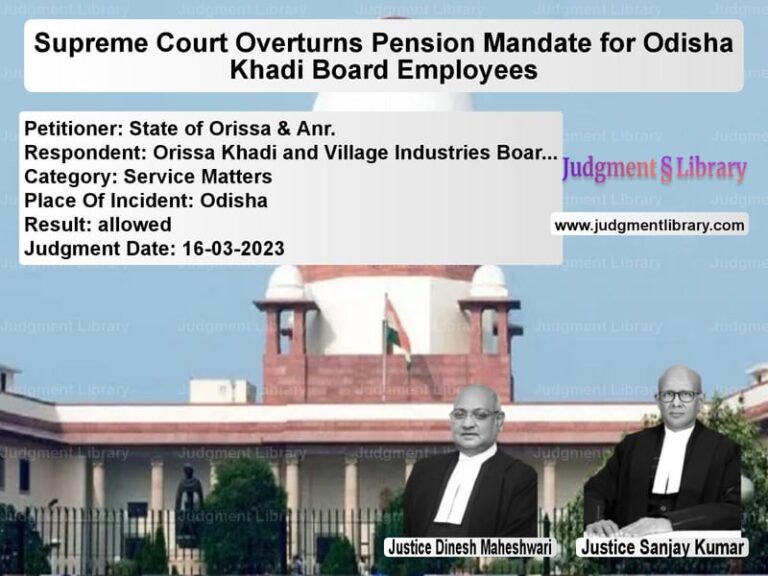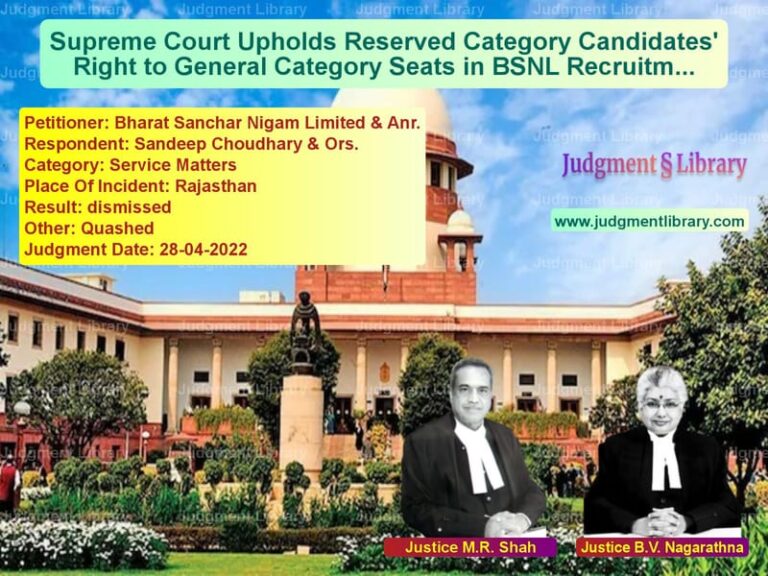Supreme Court Restores Kotak Mahindra Bank’s Settlement Order, Overturns Karnataka High Court Ruling
The Supreme Court of India has ruled in favor of Kotak Mahindra Bank Ltd. in a long-standing tax dispute, overturning the Karnataka High Court’s decision that had remanded the case to the Settlement Commission for reconsideration of penalty and prosecution immunity. This judgment sets a precedent on the scope of judicial review in Settlement Commission orders and clarifies the requirements for granting immunity under the Income Tax Act, 1961.
Background of the Case
The case arose from a dispute between Kotak Mahindra Bank (formerly ING Vysya Bank Ltd.) and the Commissioner of Income Tax, Bangalore. The appellant, a public limited banking company, had approached the Income Tax Settlement Commission to settle its tax liabilities for the assessment years 1994-95 to 1999-2000. The key issue pertained to income from leasing transactions, where the bank had treated lease rentals as financial transactions, classifying part of the rental as capital repayment and only offering the interest component for taxation.
The Assessing Officer (AO) determined that the bank had wrongfully claimed depreciation on assets that were not legally owned by it. As a result, a reassessment was initiated, and a penalty under Section 271(1)(c) of the Income Tax Act was imposed for alleged concealment of income.
Proceedings Before the Settlement Commission
Faced with multiple pending proceedings, the bank filed an application under Section 245C of the Income Tax Act before the Settlement Commission, offering additional undisclosed income. The Settlement Commission accepted the application and passed an order on 4 March 2008, determining an additional income of ₹196.36 crore. The Commission also:
- Granted the bank immunity from penalty and prosecution under Section 245H of the Act.
- Annulled the penalty imposed under Section 271(1)(c) for the assessment year 1997-98.
- Recognized that the bank had cooperated fully and made a true and complete disclosure.
High Court Intervention
The Revenue Department challenged this decision before the Karnataka High Court, arguing that the Settlement Commission had granted immunity without properly considering the bank’s alleged tax evasion. The High Court’s Single Judge Bench remanded the matter to the Settlement Commission, directing it to reconsider the question of immunity from penalty and prosecution.
The bank appealed this order in a Writ Appeal (No. 2458 of 2010), but a Division Bench of the High Court upheld the remand, ruling that the Commission had not adequately scrutinized the immunity question.
Arguments Before the Supreme Court
Petitioner (Kotak Mahindra Bank) Arguments:
- The Settlement Commission’s order was final and could only be reviewed in cases of fraud, bias, or violation of statutory provisions.
- The High Court had overstepped its jurisdiction by interfering in the discretionary powers of the Commission.
- The bank had fully cooperated and disclosed additional income, qualifying it for immunity under Section 245H.
- The penalty imposed under Section 271(1)(c) was correctly annulled as the non-disclosure resulted from adherence to RBI guidelines, not deliberate concealment.
Respondent (Income Tax Department) Arguments:
- The bank had not voluntarily disclosed income but had done so only after the Assessing Officer detected discrepancies.
- Immunity from penalty and prosecution should not have been granted without a detailed inquiry.
- The High Court was justified in remanding the matter as the Settlement Commission had failed to apply its mind.
Supreme Court’s Analysis and Judgment
A bench comprising Justices B.V. Nagarathna and Ujjal Bhuyan ruled in favor of Kotak Mahindra Bank, setting aside the High Court’s judgment. The Court made the following key observations:
1. Judicial Review of Settlement Commission Orders is Limited
The Court reiterated that the powers of the Settlement Commission are discretionary and that High Courts should not act as appellate authorities:
“The High Court should not scrutinize an order or proceeding of the Settlement Commission as an appellate court. Unsettling reasoned orders of the Settlement Commission may erode the confidence of bona fide assessees.”
2. Full and True Disclosure Requirement Was Met
The Supreme Court held that the bank had met the criteria under Section 245C by offering additional undisclosed income and cooperating with tax authorities:
“The application to the Settlement Commission must be examined on the framework of law at the time of its filing. The bank had made a full and true disclosure, as required.”
3. No Justification for Remanding the Matter
The Court criticized the High Court’s reasoning, noting that the Commission had examined all relevant factors:
“The High Court erred in remanding the matter for reconsideration. The Commission had rightly exercised its discretion under Section 245H.”
4. Revenue’s Objection Was Procedurally Incorrect
The Supreme Court observed that the Revenue had earlier raised preliminary objections to the Settlement Commission’s jurisdiction, which had been rejected. It was improper to raise similar objections again before the High Court.
Final Verdict
The Supreme Court ruled:
- The 4 March 2008 order of the Settlement Commission was restored.
- The Karnataka High Court’s judgment dated 6 July 2012 was set aside.
- The bank’s immunity from penalty and prosecution remained intact.
- No costs were awarded to either party.
Implications of the Judgment
This ruling has far-reaching consequences:
- Limits Judicial Interference: High Courts must exercise caution when reviewing Settlement Commission orders.
- Encourages Tax Settlements: The ruling strengthens confidence in tax settlement mechanisms.
- Clarifies Disclosure Requirements: Assessees can disclose additional income discovered during assessments without fear of automatic rejection.
- Reinforces RBI Guidelines: Adherence to regulatory accounting standards cannot be equated with tax evasion.
Conclusion
The Supreme Court’s ruling in Kotak Mahindra Bank vs. Commissioner of Income Tax marks a victory for assessees seeking settlement of tax disputes. By reaffirming the discretionary powers of the Settlement Commission, the judgment ensures that tax dispute resolution remains efficient and fair.
This landmark decision not only upholds procedural fairness but also serves as a guiding precedent for future tax settlements in India.
Petitioner Name: Kotak Mahindra Bank Limited.Respondent Name: Commissioner of Income Tax, Bangalore.Judgment By: Justice B.V. Nagarathna, Justice Ujjal Bhuyan.Place Of Incident: Bangalore, Karnataka.Judgment Date: 25-09-2023.
Don’t miss out on the full details! Download the complete judgment in PDF format below and gain valuable insights instantly!
Download Judgment: kotak-mahindra-bank-vs-commissioner-of-inco-supreme-court-of-india-judgment-dated-25-09-2023.pdf
Directly Download Judgment: Directly download this Judgment
See all petitions in Income Tax Disputes
See all petitions in Tax Evasion Cases
See all petitions in Banking Regulations
See all petitions in Judgment by B.V. Nagarathna
See all petitions in Judgment by Ujjal Bhuyan
See all petitions in allowed
See all petitions in Remanded
See all petitions in supreme court of India judgments September 2023
See all petitions in 2023 judgments
See all posts in Taxation and Financial Cases Category
See all allowed petitions in Taxation and Financial Cases Category
See all Dismissed petitions in Taxation and Financial Cases Category
See all partially allowed petitions in Taxation and Financial Cases Category

